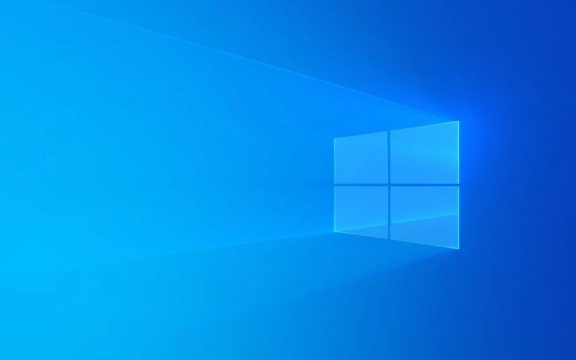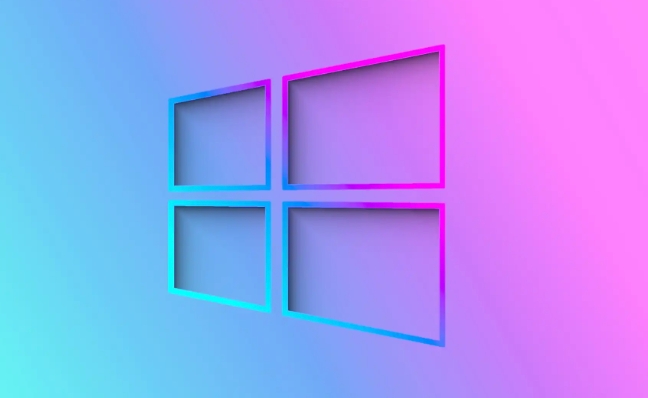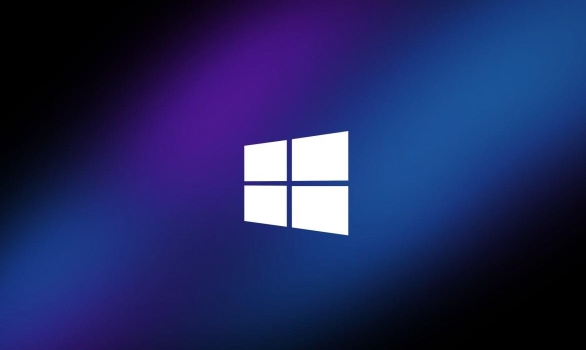Why is my Windows not saving my display settings?
Aug 02, 2025 am 11:10 AMUpdate or reinstall graphics drivers via Device Manager or the manufacturer’s website to resolve driver-related issues. 2. Set a primary display, arrange monitors properly in Display settings, and avoid using Win P shortcuts to maintain consistent multi-monitor configurations. 3. Disable Fast Startup in Power Options to ensure proper hardware detection during boot. 4. Run sfc /scannow, install Windows updates, and create a new user profile to fix corrupted system or user files. 5. Check and secure all video cables, ports, and test with one monitor to rule out hardware or connection problems. 6. Disable third-party software like display utilities or gaming overlays that may interfere with display settings, and check manufacturer-specific display or power management tools on laptops. Fixing driver and hardware detection issues typically resolves Windows failing to save display settings.

If your Windows isn't saving display settings—like resolution, brightness, orientation, or multiple monitor arrangements—it can be frustrating and disruptive. This issue usually stems from driver problems, system misconfigurations, or hardware detection glitches. Here’s a breakdown of the most common causes and how to fix them.

1. Graphics Driver Issues
Outdated, corrupted, or incompatible graphics drivers are the top reason Windows fails to remember display settings.
What to do:

-
Update your graphics driver:
- Press
Win X→ choose Device Manager. - Expand Display adapters, right-click your GPU (e.g., Intel HD Graphics, NVIDIA, AMD), and select Update driver.
- Choose Search automatically for updated driver software.
- Press
-
Reinstall the driver:
- In Device Manager, right-click the graphics adapter and select Uninstall device.
- Restart your PC—Windows will reinstall the driver automatically.
-
Use manufacturer’s website:
- Download the latest driver from Intel, NVIDIA, or AMD (based on your GPU).
- Install it manually for better compatibility.
Note: Generic drivers from Windows Update may not fully support all display features.
2. Multiple Monitors or External Displays
If you frequently connect and disconnect external monitors, Windows may default to basic settings each time.

What to do:
-
Set a primary display:
- Right-click desktop → Display settings.
- Identify each monitor and mark one as "Make this my main display".
-
Save the display layout:
- Arrange your monitors visually in the settings to match your physical setup.
- Choose a consistent multiple display mode (e.g., "Extend these displays").
-
Avoid "Project" shortcuts overriding settings:
- Pressing
Win Pand choosing a temporary mode (like Duplicate or Second screen only) can reset things. - Always go back to Display Settings and reapply your preferred layout.
- Pressing
3. Fast Startup Interfering
Fast Startup (a hybrid shutdown feature) can prevent Windows from properly detecting hardware on boot, leading to reset display settings.
How to disable it:
- Go to Control Panel > Power Options > Choose what the power buttons do.
- Click "Change settings that are currently unavailable".
- Uncheck "Turn on fast startup".
- Save changes and restart.
This forces a full shutdown and reboot, which helps Windows reinitialize hardware properly.
4. Corrupted User Profile or System Files
Sometimes, system or user profile corruption can prevent settings from being saved.
Try these:
-
Run System File Checker:
- Open Command Prompt as admin.
- Type
sfc /scannowand press Enter. - Let it repair any corrupted system files.
-
Check for Windows updates:
- Some display-saving bugs are fixed in updates.
- Go to Settings > Update & Security > Windows Update and install pending updates.
-
Create a new user profile:
- If the issue persists only for your account, the profile might be damaged.
- Create a new local user and test display settings there.
5. Hardware or Connection Issues
Loose cables, faulty ports, or problematic monitors can make Windows think displays are changing, forcing it to reset.
Check:
- Secure all video cables (HDMI, DisplayPort, etc.).
- Try a different cable or port.
- Test with one monitor at a time to isolate the issue.
6. Third-Party Software Conflicts
Apps like display calibration tools, gaming overlays (e.g., GeForce Experience), or screen brightness utilities can override Windows settings.
What to do:
- Temporarily disable or uninstall such software.
- Check if the problem goes away.
- Re-enable one by one to identify the culprit.
In most cases, updating or reinstalling your graphics driver and disabling Fast Startup resolves the issue. If you're on a laptop, also check your manufacturer’s display or power management software (like Dell Display Manager or Lenovo Vantage), as those can interfere too.
Basically, Windows needs stable hardware detection and proper drivers to remember your display setup—fix those, and your settings should stick.
The above is the detailed content of Why is my Windows not saving my display settings?. For more information, please follow other related articles on the PHP Chinese website!

Hot AI Tools

Undress AI Tool
Undress images for free

Undresser.AI Undress
AI-powered app for creating realistic nude photos

AI Clothes Remover
Online AI tool for removing clothes from photos.

Clothoff.io
AI clothes remover

Video Face Swap
Swap faces in any video effortlessly with our completely free AI face swap tool!

Hot Article

Hot Tools

Notepad++7.3.1
Easy-to-use and free code editor

SublimeText3 Chinese version
Chinese version, very easy to use

Zend Studio 13.0.1
Powerful PHP integrated development environment

Dreamweaver CS6
Visual web development tools

SublimeText3 Mac version
God-level code editing software (SublimeText3)

Hot Topics
 How to assign a drive letter in Windows
Jul 30, 2025 am 04:54 AM
How to assign a drive letter in Windows
Jul 30, 2025 am 04:54 AM
ToassignadriveletterinWindows,useDiskManagementorCommandPrompt.2.InDiskManagement,pressWindows X,selectDiskManagement,right-clickthevolumewithoutaletter,choose"ChangeDriveLetterandPaths",clickAdd,selectaletter(avoidA:orB:),andclickOK.3.Alte
 Binance official website safely enter Binance new version download and install
Jul 30, 2025 pm 06:27 PM
Binance official website safely enter Binance new version download and install
Jul 30, 2025 pm 06:27 PM
The core methods of secure access to Binance official website are: 1. Manually enter the official website and add bookmarks; 2. Verify the lock icon and HTTPS in the browser address bar; 3. Avoid clicking on links in search engines, social media or unknown messages. When downloading a new version of the application, the desktop should be downloaded from the official website, iOS users should go through the App Store, and Android users should choose Google Play. If you cannot access it, you must download it through the verified official website. Always enable two-factor verification and be alert to false customer service information to ensure your account is secure.
 How to find the installation date of Windows
Jul 30, 2025 am 04:57 AM
How to find the installation date of Windows
Jul 30, 2025 am 04:57 AM
UseCommandPromptbytypingsysteminfo|find"OriginalInstallDate"toinstantlyseetheoriginalWindowsinstallationdate.2.Alternatively,usePowerShellwith(Get-ItemProperty-Path"HKLM:\SOFTWARE\Microsoft\WindowsNT\CurrentVersion").InstallDatean
 How to change the system display language for all users in Windows
Jul 31, 2025 am 08:18 AM
How to change the system display language for all users in Windows
Jul 31, 2025 am 08:18 AM
InstallthedesiredlanguagepackviaSettings→Time&Language→Language®ion,ensuring"SetasmyWindowsdisplaylanguage"isselected.2.Changethesystemdisplaylanguageinthesamemenuandrestart.3.OpenControlPanel→Region→Administrativetab,click"
 How to set up an FTP server in Windows
Jul 30, 2025 am 04:02 AM
How to set up an FTP server in Windows
Jul 30, 2025 am 04:02 AM
InstallIISandFTPcomponentsviaWindowsFeatures,ensuringFTPService,FTPExtensibility,andIISManagementConsoleareenabled.2.CreateadedicatedFTPfolder(e.g.,C:\FTP),grantIIS_IUSRSModifypermissions,andoptionallyaddspecificusers.3.InIISManager,addanFTPsitebyspe
 How to create a system image in Windows
Jul 30, 2025 am 04:57 AM
How to create a system image in Windows
Jul 30, 2025 am 04:57 AM
OpenBackupandRestoreviaWindows S,typeBackupandRestore,clickCreateasystemimage.2.Savetheimagetoanexternalharddrive(recommended),selectitfromthedropdown,andclickNext.3.Confirmincludeddrives(systemreservedandC:bydefault),addothersifneeded,thenclickNext.
 How to install Windows on a Mac without Boot Camp
Jul 31, 2025 am 11:58 AM
How to install Windows on a Mac without Boot Camp
Jul 31, 2025 am 11:58 AM
Without BootCamp, installing Windows on Mac is feasible and works for different chips and needs. 1. First check compatibility: The M1/M2 chip Mac cannot use BootCamp, it is recommended to use virtualization tools; the Intel chip Mac can manually create a boot USB disk and install it in partition. 2. Recommended to use virtual machines (VMs) for M1 and above chip users: Windows ISO files, virtualization software (such as ParallelsDesktop or UTM), at least 64GB of free space, and reasonably allocate resources. 3. IntelMac users can manually install it by booting the USB drive: USB drive, WindowsISO, DiskU is required
 How to fix a 'No speakers or headphones are plugged in' error in Windows
Jul 30, 2025 am 04:46 AM
How to fix a 'No speakers or headphones are plugged in' error in Windows
Jul 30, 2025 am 04:46 AM
First check the physical connection, re-plug and unplug the device and test different ports or devices to troubleshoot hardware problems; 2. Run Windows Audio Troubleshooting to automatically fix common problems; 3. Enable and set the playback device to the default output in the sound settings; 4. Update, reinstall or manually install the latest audio driver through the Device Manager; 5. Realtek users need to enable the audio jack detection function in the audio control panel; 6. Enter the BIOS if necessary to ensure that the onboard audio controller is enabled; 7. Finally, you can restart the Windows Audio Service Quick Recovery function. In most cases, this problem is caused by driver or setting errors, and you can solve it by following the steps.






